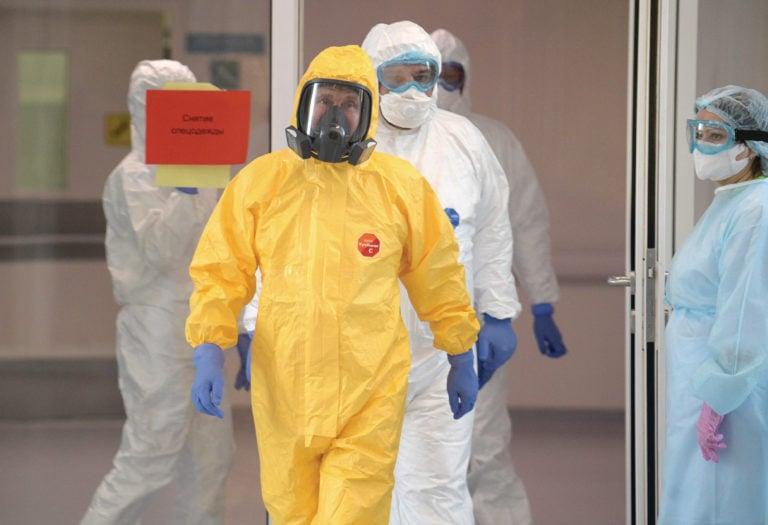Vladimir Putin: Russia’s weak strongman
Shannon Gormley: Putin has perhaps never been more insecure than he is at this moment. Naturally, he has just made a grab for lifelong power.

Clad in bright yellow protective gear, Putin visits a Moscow hospital treating COVID-19 patients (Alexey Druzhinin/SPUTNIK/AFP/Getty Images)
Share
Vladimir Putin inspires many thoughts (“He is an evil man,” thinks John McCain in his memoirs; “Will he become my new best friend?” thinks Trump in a tweet), but none so common as two competing ideas of the Russian president’s power, each ruminated upon by his adversaries but each seeming to oppose the other: “Putin is weak,” think some; or, think others, “Putin is strong.”
In fact Putin is both weak and strong. The relationship between each quality is more dynamic than mere coexistence, and his frailty reinforces his menace and his menace reinforces his frailty, as Russia-watchers have observed. The more insecure Putin becomes, the more frightened he becomes; the more frightened he becomes, the more aggressive he becomes; the more aggressive he becomes, the more reckless he becomes; the more reckless he becomes, the more insecure he becomes—and so on and so forth as Crimea is annexed, American elections are meddled with, Syria is sacrificed.
And Putin has perhaps never been more insecure than he is at this moment; naturally, he has just made a grab for lifelong power. As his popularity has declined, he has held a referendum to extend presidential term limits that could allow him to rule into his 80s. It is out of weakness that he has attempted to ensure he can rule as a strongman for life.
The “Putin is weak, not strong” belief is compelling: under him, Russia is suffering from grave and obvious problems. There are the economic problems: oil prices are down; the ruble is very down; sanctions are up; sanctions are staying up; young people are leaving. Old people, his political base, have threatened to leave him, particularly over an abortive proposal to raise the retirement age. The country is spending too much money supporting separatists outside its borders, and within its borders not enough money keeping people above the poverty line; people living below the poverty line—one in every four families with children—watch angrily as the president’s allies and the president’s son-in-law and the president himself become multi-billionaires. Some of those allies have been targeted by sanctions.
READ MORE: Vladimir Putin’s war against truth, justice and Sergei Magnitsky
In addition to the economic problems, there are the health problems—rather, there is the health problem, made worse by all the economic problems and making the economic problems altogether worse in turn. Russia—in which half of all medical facilities have no hot water and half of all hospital beds were cut between 2000 and 2015, according to the Wall Street Journal—has the third-largest number of confirmed COVID-19 cases in the world: over 650,000. Though it is not known precisely how many Russian people have died from the virus, Putin could have certainly done more to curb its spread, which might have curbed the decline in Russia’s GDP.
Although the Russian president’s weaknesses may go unreported due to the Russian media’s weaknesses, Russian people cannot help noticing that under the present system they suffer manifold intolerable weaknesses of their own. In the past few years, some of Putin’s own allies have spoken out against his policy failures; some of Putin’s own party members have run as independents. Putin’s approval rating is lower than it has been in three decades.
So, yes, Putin is weak—indeed, the only argument as persuasive as the “Putin is weak, not strong” argument is the “Putin is strong, not weak” argument.
RELATED: Vladimir Putin considers this Newfoundland man a ‘friend’
Within its borders, Russian media is largely under Putin’s thumb, Russian institutions are largely dwarfed by Putin’s control, Putin is Russia’s longest-ruling leader since Stalin, and though his popularity is low compared to his past self, it is high compared to many past and present Western leaders.
Beyond Russia, the country can appear even stronger. Russia has invaded Georgia. It has invaded Ukraine. Nordic countries are afraid it will invade them. It has quite possibly swayed a civil war in the Middle East in favour of a dictator who has murdered, tortured and displaced millions of his own people, swayed an American presidential election in favour of a serial sexual assailant whose businesses have had to declare bankruptcy several times, and swayed a British referendum in favour of ruining that country.
These are not the actions of a weak man but a strong one—at least, they would be were he not so weak. Putin’s adventures abroad are meant to appeal to his own people, who have good reason to feel disempowered in their country and might wish not to feel disempowered in the world.
The danger Putin poses amplifies and obscures the state of endangerment in which he lives. And now, when Putin’s power is threatened—by pandemic, by economics, by the disillusionment of Russian people—it is shored up in a move animated by a spirit of fragile fortitude that Russian-American journalist Julia Ioffe once described as “classically Putin, and classically Russian: using daring aggression to mask weakness, to avenge deep resentments and, at all costs, to survive.”
This article appears in print in the August 2020 issue of Maclean’s magazine with the headline, “The weak strongman.” Subscribe to the monthly print magazine here.